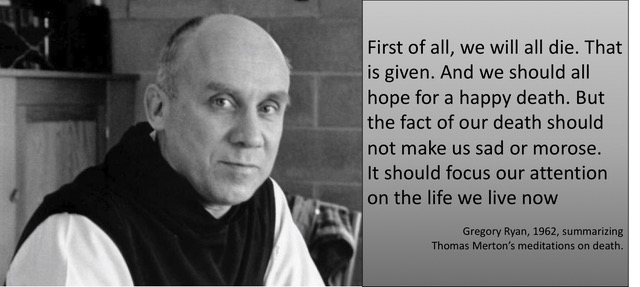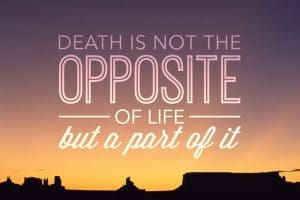Talking About Death and Happiness
Death—and its relationship to life—has been pushing onto my agenda in the past month, so much so that when I sat down to write this month’s post, I found it impossible to not write about it.
“But Jim, “you are possibly thinking, “isn’t this site about happiness and leadership?” Well, yes. And as you’ll see, I create that linkage. So, stick with me, dear readers!
I suspect that for some of you, this topic may push into your zone of discomfort. If so, I make no apologies, for that is what coaches do. We challenge, we provoke, we invite a new perspective.
Savoring and Sadness
I recently attended a memorial service for a friend, mentor, and fellow coach who died suddenly and unexpectedly the week prior. Only 56 years old, he had collapsed and died during a public training session, leaving us stunned and bereft of happiness.
While a strong sense of sadness pervaded the event (and many tears were shed) the conversation kept returning to happy memories and stories that made us all laugh out loud. We focused as much time and energy on speaking to the void that his death will leave as we did to the things that we will do in the future to ensure that his work in the world will become his legacy.
As a veteran of many funerals, this memorial was both unique (because Mark was a one-in-a-million guy) and familiar to me. I have lost a parent, a sibling, and a child, as well as grandparents, in-laws, aunts and uncles, and countless friends and distant relatives. Someone dies and we gather to mourn their loss. And what do we do in the days leading up to the funeral service? We create videos. We pull out photo books and build collages to celebrate that individual’s life. We bake things. Then we get together and share food and drink and stories.
Lots of stories. Do you remember that time when…? They always used to say….
I remember standing in the receiving line at my daughter’s wake and being struck by the simultaneity of deep sadness and celebration. Savoring the good times kept us all from sinking into the quicksand of grief.
In fact, as I reflected on my entire life experience of death, I find it hard to remember a time when happiness and gratitude were not present, just under the surface of the sadness and grief, keeping us afloat, and connecting us to the good memories we chose to curate and keep for the future.
Death and Happiness often co-exist, dancing and supporting one another.
Additional reflections on Death
Death is not the opposite of life, but a part of it. This graphic came to me on Pinterest, a lovely reminder that we will all have our moment.
The gift of death. During Mark’s memorial service, one of my colleagues offered this reflection: “The gift of his death is that we are reminded to enjoy every moment of the precious life we have been given.”
Speaking of another’s legacy can help us get in touch with our own. A classic exercise around vision and purpose is to write the eulogy you want spoken at your own funeral. For what did you stand? What did you mean to people? What stories do you want told about you after your death? This exercise reveals the values you want to have held and the choices you want to have made. You can compare those to the way you are currently living your life and make a conscious decision now to put yourself on a path to making that eulogy real.
Would I be OK with that? Because I had health problems when I was younger, and perhaps because my father died in his 50s, every funeral I have attended in the past decade has caused me to revisit my values and consider what would happen if I were to die suddenly, tomorrow.
Would I be OK with the stories people shared over a meal at my funeral? Would people have things to laugh about as well as cry about at my passing?
I am not a grim person who dwells on death, but I find this exercise useful to help guide the decisions I make. Meanwhile, I get up five days a week and exercise and I watch what I eat, because—while I would like to feel prepared to go at any time—I don’t intend for that to happen for a long time. (Seriously, my plan is to drop dead in the middle of running a marathon at age 97. But you know what they say: Man plans. God laughs!)
The Circle of Life
On a lighter note, my grandchildren will attend the stage musical version of The Lion King soon, and in preparation we have watched both the original animated version of the movie and the new live action remake. In both, there is a scene between the young cub, Simba, and his father the king, Mufasa (cue the deep resonant voice of James Earl Jones):
Mufasa:
Everything you see exists together in a delicate balance. As king, you need to understand that balance and respect all the creatures, from the crawling ant to the leaping antelope.
Young Simba:
But dad, don’t we eat the antelope?
Mufasa:
Yes, Simba, but let me explain. When we die, our bodies become the grass, and the antelope eat the grass. And so, we are all connected in the great Circle of Life.
Meditation On Your Death
Last year we attended a marriage workshop in which the speaker encouraged us to meditate on our death. He referenced the work of the Catholic monk/philosopher, Thomas Merton, who reminded us that death is a part of life. Writer Gregory Ryan summed it up in like this:
First of all, we will all die. That is given. And we should all hope for a happy death. But the fact of our death should not make us sad or morose. It should focus our attention on the life we live now.
In other words, we all have an expiration date. Prior to reaching that, we have the freedom—some might argue the responsibility—to enjoy the time we’ve been granted, to use our gifts to the maximum, to learn and grow and dance and enjoy as many moments of happiness as we can create or notice!
~*~*~*~*~*~*~*~*~*~*~*~*~*~
Seeking support for your Happiness? Grab this summary of The 13 Principles of Happiness and post it on your refrigerator or workstation to remind you that every day, you have options.
~*~*~*~*~*~*~*~*~*~*~*~*~*~
In The Workplace: Your Legacy?
What will be the impact of your having passed through this place?
Mark, the colleague whose memorial service I mentioned earlier in this newsletter, was also the cofounder and leader of a global company that has affected thousands of lives. Leaders have an additional set of responsibilities to their organizations and stakeholders — for when they are gone, the organization must have the resources to continue.
I often speak to my clients about the “hit by a bus“ scenario. If you were to be in an accident tomorrow morning that pulled you suddenly out of the workplace for the next six months, do you have people in place who are confident and capable to do the jobs that need to be done? Or have you held all power and information closely, such that without you, the organization will collapse? If the latter, you are not being a good leader.
When I moved through my sadness about Mark‘s death and reflected on his legacy, I was impressed with the degree to which he had systematically, over many years, challenged people on the team to step up and handle nearly every aspect of what he himself did. Collectively, the team will be able to continue his great work in the world. And that’s significant.
Whether it is at your departure from your current job next year or your retirement from the workplace years from now, what do you want said about you?
- He helped me when I needed a hand.
- She supported my development.
- I always felt respected and understood when in their presence.
- I always knew where I stood with my boss.
- They pushed me beyond what I thought my limits were.
- I would not be who I am today without her mentoring and encouragement.
- He made a difference in my career and my life.
- They believed in me.
If you want people to share stories like those when you move on, consider what conversations you need to be having today. Now go out there and Lead well!
Remember, Leadership is not about a title. Anyone can be a Leader who challenges others to grow, encourages them when they are down, and who leaves a legacy of love and respect.


